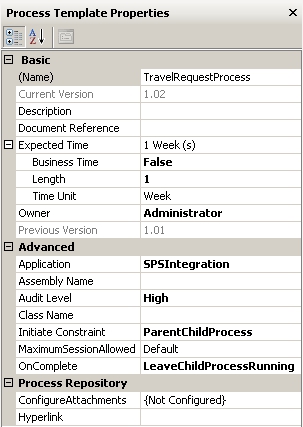The Process Template Properties are visible when no activities are selected in the process model. A definition for each property can be found below.

Design-Time Properties
(Name)
The actual name of the process template that AgilePoint retains.
Current Version
The current version of the process template. The next time the process template is deployed to AgilePoint Server, the process version will be updated.
Description
Provides a text box pop for which to enter a description for the process template.
Document Reference
A reference to a document associated with the process template.
Expected Time
The amount of time that is configured for the process to complete.
Business Time
Specifies if the expected completion time will be based on business days. This property can be set to the following specific values:
- True - This value indicates that the expected time will be based on business days, where 5 days is equal to 1 week.
- False - This value indicates that the expected time will be not be based on business days, where 7 days is equal to 1 week.
Length
The number of time units for the expected time (e.g. 1 second, minute, hour, etc.).
Time Unit
The unit of time to be used for the expected time.
Owner
A name given to the owner of the process template.
Previous Version
The previous version of the process template.
Application
The process template application type (e.g. SPSIntegration for SharePoint based process templates that will be associated with a SharePoint library or list, or a custom name given as the name of an ASP.NET application).
Assembly Name
The name of the custom assembly that the process template is associated with.
Audit Level
Default value: High
This property determines the amount of process related data that is recorded to the workflow database. This property can be set at either the Process Template Properties layer or at the individual AgileShape layer. This property allows you to control the level of granularity in terms of the amount of process related data that is recorded to the workflow database. This property can be set to the following specific values:
- High - This value indicates that AgilePoint will record all data about the activity or process to the database.
- Low - This value indicates that AgilePoint will only allow a certain amount of data to be recorded to the database. This option provides a level of control over the granularity of AgilePoint process-related data that is stored in the AgilePoint workflow database, giving some flexibility in the audit trail records by filtering out unnecessary data.
Class Name
The name of the custom class that the process template is associated with.
Initiate Constraint
The type of process model. This determines the category for which this process model is associated under the license model. If the process model is of type ChildProcess, it cannot be initiated as a stand alone process. A ParentChildProcess can be initiated as either a Parent or Child process, it counts as a Parent process.
MaximumSessionAllowed
MaximumSessionAllowed allows you to set the MaxloopAllowed at the process model level to avoid an infinite loop scenario. Now you can set the MaxLoop to a number where the engine will then mark the process as suspended. The process level MaxLoop setting overwrites the global/server level setting in the Netflow.cfg file. If this property is set to the 'Default' the process will inherit the global/server level setting in the NetFlow.cfg.
OnComplete
Determines the fate of the child process once the parent process completes. This property can be set to the following specific values:
- LeaveChildProcessRunning - This value indicates that the child process will continue to run after the parent process completes.
- CancelChildProcesses - This value indicates that child processes will be canceled once the parent process completes.
- InheritParentProcess - This value indicates that child processes will inherit the OnComplete properties of the parent process.
ConfigureAttachments
Allows you to attach documents at the process model level that are accessed from the process repository. For more information, see Process Repository.
Reference URL
Allows you to associate an URL at the process model level that is used in the process repository. For more information, see Process Repository.
